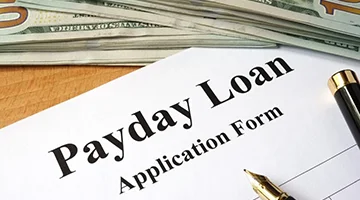What Do I Need for a Payday Loan?

Sometimes, life throws a lot of unexpected expenses at you when you least expect them. Payday loans are short-term high-cost loans aimed to provide money for emergencies. Maybe you ask yourself, “What do I need to get a payday loan?” For some people, they’re a total lifesaver in a crisis. For others, they are unsuitable because of the high interest rates. One thing is sure: they are sometimes easy to get.
15M Finance will explain payday loans, so you know what you’re getting into. We will answer the question “What do I need for a payday loan?” and walk you through how the loans work, the requirements you need to meet, and things to consider. This will help you make the most intelligent choices.
Table of Contents
- How to Get Approved for a Payday Loan?
- How to Obtain a Payday Loan?
- Important Considerations Before Applying for a Payday Loan
- Alternatives to Payday Loans
- Bottom Line for Payday Loan Requirements
How to Get Approved for a Payday Loan?
Most payday lenders have the same requirements. However, some payday loan providers may have additional criteria applicants must meet. Here’s an overview of what do you need to get a payday loan:
Be at least 18, though some states have higher age requirements for a payday loan; Proof of income from a steady job; A personal bank account to receive the payday loan and make payments; Live in the state where you’re applying. Identification like a license or passport proves who you are; Provide a phone number and email to contact you.
What Document Do You Need for a Payday Loan?
Most lenders want to see proof of income, like a pay stub or bank records. You will also need a copy of your ID and Social Security number to fill out an application form.
How to Obtain a Payday Loan?
Getting a payday loan usually involves these steps:
- Research payday lenders. Look into trusted payday loan companies online or in stores. Make sure the lender follows state laws regarding payday loans.
- Check the payday loan qualifications. Payday lenders typically want you to be at least 18, have proof of income, and have a bank account (an active checking account).
- Get documents ready. You may need proof of income, ID, and banking details.
- Apply for the payday loan. Complete and submit the lender’s application on their website or in person. Provide with the correct personal and financial information.
- Receive the approval decision. The lender will quickly check your financial situation to determine whether you’re eligible based on your income and other factors.
- Check loan details. The lender will provide information about the loan amounts, fees, interest rate, and payment schedule. Read this information carefully.
- Get the money. If the applicant agrees to the terms, the cash goes right into the borrower’s bank account, usually in one business day or less for online loans.
Payday loans are short-term, meaning you repay the loan on your next payday. The lender takes the payday loan amount plus fees and interest straight from your account on the day you agreed.
Important Considerations Before Applying for a Payday Loan
Before you take out a payday loan, you must understand what needs payday lenders are filling. These loans might give you quick money, but they come with high interest and fees that can trap you in debt and lead to collection agency calls. Check these factors before considering a payday loan:
The interest rates and fees may reach 400% APR or more. Plus, all those extra fees they tack on add up. Therefore, payday loans are not the cheapest way to borrow money. You usually have just two weeks or a month to repay the loan. If money is already tight, that timeline can be a huge pressure cooker. If you can’t repay the loan on the next payday, you might be forced to roll it over into another new loan with even more fees and interest piling up. Even if payday lenders don’t perform a credit check to verify the borrower’s credit history, not paying back loans still wrecks your score. If they report you to credit bureaus for late payment, your score will tank. It will make qualifying for future loans or credit cards more challenging. Payday loans can trap you in debt cycles. Thus, you will keep paying fees without lowering your debt. Many borrowers can only partially repay by the deadline, so they take out a new payday loan to pay off the old one. This cycle repeats, with people continuously paying high interest rates but never covering the original loan amounts borrowed. Before getting a payday loan, try to borrow from family or friends, ask creditors for more time to pay, or seek help from local aid organizations or Pew charitable trusts. You can also look into other short-term loans from a credit union or advances from your job, which usually have better terms. Having an emergency fund can help you avoid payday loans. You would cover your emergencies on the same day without paying any interest rates charged by lenders. It is suitable, especially when you have other debts to pay.

Alternatives to Payday Loans
Payday loans are tricky if you don’t know how to manage them. They carry high rates, and you must pay them back quickly. But some other choices won’t hit your wallet as hard. Consider this list of alternatives.
Installment loans
Installment loans let you borrow some cash upfront and pay it back bit by bit over time. They are more manageable than payday loans that need to be repaid in up to 30 days. You can borrow from $1,000 up to $5,000 with a maximum term of 60 months.
Credit unions
Credit unions don’t try to make profits, so their rates are low. Some even offer financial advice to help you manage your finances. Most credit unions also provide different short-term loan programs at discounted rates.
Cash advance from the employer
Your employer might let you snag part of your paycheck early if you need quick cash. It is better than forking over money to a payday lender.
Credit card cash advances
Their fees may get high, but they are usually better than payday loans. Your credit card will have a limit that usually doesn’t exceed $2,000. Just be careful. Make sure you understand the terms and borrow only what you need.
Peer-to-peer platforms
Some websites connect people who need money with investors willing to lend it. The rates and payment plans are reasonable, and these sites can be better than payday loans.
Non-profit organizations
Community organizations help people short on cash or struggling to pay bills. They may give out low-interest loans or grants or help people manage their money better.
Bottom Line for Payday Loan Requirements
Payday loans can seem like an easy fix when you need cash quickly, but you must be careful. They’ll get you with high-interest rates and fees before you can blink. Payday loans are easy to get but they carry a lot of risks. The money helps for a minute, but the next thing you know, you’re trapped in a nasty debt cycle you can’t get out of. That is why it is crucial to practice responsible borrowing and be informed about alternatives.
Know what you’re committing to and look at all your options first. Your job could give you an advance, or you can borrow from family and friends. You could also check out credit card cash advances or loans from non-profits and make it till your next payday.
We advise you to educate yourself on payday loan risks. Make sure you can comfortably pay the money back before going into debt. Also, review the potential terms thoroughly to ensure you understand them. Information is power when it comes to handling your finances. Making smart money moves now will pay off big time later.
See also:
- How Long Does It Take to Get a Payday Loan?
- Can I Have 2 Payday Loans at Once?
- Payday Loan Scams: How to Recognize and Avoid Them?
References:
